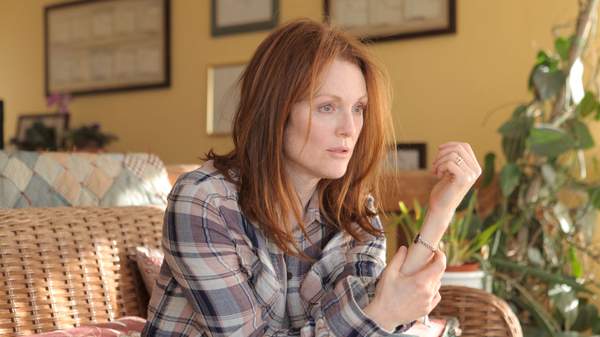Overview
Films about terminal illness can be a tricky proposition. There’s only so much drama that can be wrung from the mundane inevitability of death, a process that, by its very nature, is so horribly undramatic. Too often do filmmakers and actors make the mistake of overcompensating, wallowing in misery or resorting to cheap emotional manipulation. It’s for its avoidance of these pitfalls, as much as anything else, that Still Alice deserves your attention.
Adapted from the novel by neuroscientist turned author Lisa Genova, Still Alice tells the story of Columbia linguistics professor Alice Howland (Julianne Moore). In one of the first scenes we see her, she’s giving a lecture in Los Angeles, when suddenly she finds herself unable to recall a specific word. At first she dismisses the lapse as one of those inevitable side-effects of turning 50. When she gets lost on her regular morning jog, however, she realises something more serious is amiss. A visit to her doctor brings a devastating diagnosis: early onset Alzheimer’s, a disease without a cure.
In the film’s lead role, Moore is simply magnificent — she’s already taken home the Golden Globe, and seems a lock to win the Oscar. Alice deals with her condition proactively — at one point she even visits a nursing home, under the guise of finding a room for an elderly parent. Inevitably, however, the illness takes its toll. Slowly, we watch her go from an articulate, passionate, independent woman to a shell of her former self. It’s a heartbreaking transition, and Moore captures every moment — with honesty, nuance and whatever small measure of dignity she can muster.
So too do we witness the effect the disease has on the afflicted person’s family. Alec Baldwin gives a terrifically understated performance as Alice’s husband, John, a New York intellectual suddenly confronted with a future he may not be able to accept. Even more impressive is Kristen Stewart as Lydia, the youngest of John and Alice’s adult children. Although she's (rightfully) bemoaned for her wooden performances in the Twilight movies — frankly, no one could make that dialogue sound good — it’s abundantly clear that Stewart has talent. Here, both the actress and her character exhibit a maturity far beyond their years.
Credit must also go to the movie's married co-directors, Wash Westmoreland and Richard Glatzer. They’re the perfect fit for the project, having experienced similar medical hardship themselves. Glatzer lives with ALS and is unable to speak, communicating with actors on set via an iPad. It’s their sensitive, compassionate storytelling — channeled by their cast — that ensures Still Alice sticks in your memory even after Alice forgets.
